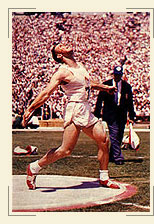|
 Alfred
Oerter
Alfred
Oerter
He was born on 19 September 1936 in Astoria, New York and he is considered to be the greatest discus thrower in the history of the Olympic  Games. Before him only two athletes had won in the discus throw two consecutive gold medals in the Olympic Games: Martin Sheridan (1904, 1908) and Clarence "Bud" Houser (1924, 1928). Alfred Oerter was the gold Olympic winner at four successive Olympic organizations, from 1956 until 1968, an achievement that cannot be easily repeated. Games. Before him only two athletes had won in the discus throw two consecutive gold medals in the Olympic Games: Martin Sheridan (1904, 1908) and Clarence "Bud" Houser (1924, 1928). Alfred Oerter was the gold Olympic winner at four successive Olympic organizations, from 1956 until 1968, an achievement that cannot be easily repeated.
His athletic career started in his school years. He took up the discus throw coincidentally in a way. He was a track athlete and as he practised, a discus thrower threw the discus by mistake next to Oerter. The latter picked up the discus and threw it back. Although he had no particular knowledge of the sport's technique, that first throw was impressive and applied himself to that sport ever since. At the age of 18, in 1954, he was the record holder in the US school championship. His athletic career continued at Kansas University and in 1956 he won his first gold Olympic medal, setting by his very first throw a new Olympic record, despite the fact that he was not considered a favourite. The following year he won the national championship of the USA, something which he repeated five more times (1959, 1960, 1962, 1964, 1966).
In 1960, in Rome he won his second gold Olympic medal, breaking his own Olympic record. Until the fifth throw he had climbed to the second place, 15 centimetres behind his compatriot R. Babka. The latter advised him to make some minor changes in his technique and Oerter was the final winner, thus reminding of the way the American Robert Garett had beat the Greek Panagiotis Paraskevopoulos in the discus throw in 1896, at the first modern Olympic Games. Still, Oerter's toughest victories were the next two, in Tokyo (1964) and in Mexico (1968), where he competed seriously injured. However that did not keep him from winning and setting two new Olympic records.
In 1969, at the age of 33, Oerter decided to retire from competitive sport and devote to his family and his work, since he already worked as a computer specialist in an airplane manufacturing company. However, that decision lasted eight years only. In 1978, at the age of 42, he returned to competitive sport and two years later he achieved his best performance of his career, 69.46m, which was very close to the then world record. He took part in the preliminaries for the Moscow Games and ranked fourth, that is substitute member of the Olympic team. Nevertheless, the abstention of the USA from the Olympic Games of 1980 did not give him the opportunity to travel to Moscow.
Four years later, at the age of 48, he was still in fighting condition at national level, but an injury did not allow him to participate in the preliminaries for the Los Angeles Games. He continued to practise sport until the age of 60.
|